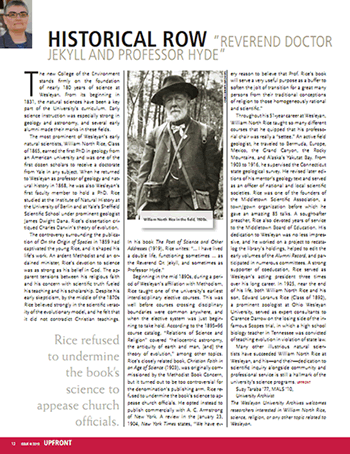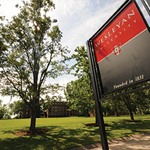HISTORICAL ROW: “REVEREND DOCTOR JEKYLL AND PROFESSOR HYDE”
 The new College of the Environment stands firmly on the foundation of nearly 180 years of science at Wesleyan. From its beginning in 1831, the natural sciences have been a key part of the University’s curriculum. Early science instruction was especially strong in geology and astronomy, and several early alumni made their marks in these fields.
The new College of the Environment stands firmly on the foundation of nearly 180 years of science at Wesleyan. From its beginning in 1831, the natural sciences have been a key part of the University’s curriculum. Early science instruction was especially strong in geology and astronomy, and several early alumni made their marks in these fields.
The most prominent of Wesleyan’s early natural scientists, William North Rice, Class of 1865, earned the first PhD in geology from an American university and was one of the first dozen scholars to receive a doctorate from Yale in any subject. When he returned to Wesleyan as professor of geology and natural history in 1868, he was also Wesleyan’s first faculty member to hold a PhD. Rice studied at the Institute of Natural History at the University of Berlin and at Yale’s Sheffield Scientific School under prominent geologist James Dwight Dana. Rice’s dissertation critiqued Charles Darwin’s theory of evolution.
The controversy surrounding the publication of On the Origin of Species in 1859 had captivated the young Rice, and it shaped his life’s work. An ardent Methodist and an ordained minister, Rice’s devotion to science was as strong as his belief in God. The apparent tensions between his religious faith and his concern with scientific truth fueled his teaching and his scholarship. Despite his early skepticism, by the middle of the 1870s Rice believed strongly in the scientific veracity of the evolutionary model, and he felt that it did not contradict Christian teachings. In his book The Poet of Science and Other Addresses (1919), Rice writes: “… I have lived a double life, functioning sometimes… as the Reverend Dr. Jekyll, and sometimes as Professor Hyde.”
Beginning in the mid 1890s, during a period of Wesleyan’s affiliation with Methodism, Rice taught one of the university’s earliest interdisciplinary elective courses. This was well before courses crossing disciplinary boundaries were common anywhere, and when the elective system was just beginning to take hold. According to the 1895–96 course catalog, “Relations of Science and Religion” covered “heliocentric astronomy, the antiquity of earth and man, [and] the theory of evolution,” among other topics. Rice’s closely related book, Christian Faith in an Age of Science (1903), was originally commissioned by the Methodist Book Concern, but it turned out to be too controversial for the denomination’s publishing arm. Rice refused to undermine the book’s science to appease church officials. He opted instead to publish commercially with A. C. Armstrong of New York. A review in the January 23, 1904, New York Times states, “We have every reason to believe that Prof. Rice’s book will serve a very useful purpose as a buffer to soften the jolt of transition for a great many persons from their traditional conceptions of religion to those homogeneously rational and scientific.”
Throughout his 51-year career at Wesleyan, William North Rice taught so many different courses that he quipped that his professorial chair was really a “settee.” An active field geologist, he traveled to Bermuda, Europe, Mexico, the Grand Canyon, the Rocky Mountains, and Alaska’s Yakutat Bay. From 1903 to 1916, he supervised the Connecticut state geological survey. He revised later editions of his mentor’s geology text and served as an officer of national and local scientific societies. Rice was one of the founders of the Middletown Scientific Association, a town/gown organization before which he gave an amazing 85 talks. A sought-after preacher, Rice also devoted years of service to the Middletown Board of Education. His dedication to Wesleyan was no less impressive, and he worked on a project to recatalog the library’s holdings, helped to edit the early volumes of the Alumni Record, and participated in numerous committees. A strong supporter of coeducation, Rice served as Wesleyan’s acting president three times over his long career. In 1925, near the end of his life, both William North Rice and his son, Edward Loranus Rice (Class of 1892), a prominent zoologist at Ohio Wesleyan University, served as expert consultants to Clarence Darrow on the losing side of the infamous Scopes trial, in which a high school biology teacher in Tennessee was convicted of teaching evolution in violation of state law.
Many other illustrious natural scientists have succeeded William North Rice at Wesleyan, and his—and their—dedication to scientific inquiry alongside community and professional service is still a hallmark of the university’s science programs.
Suzy Taraba ’77, MALS ’10,
University Archivist
The Wesleyan University Archives welcomes researchers interested in William North Rice, science, religion, or any other topic related to Wesleyan.

